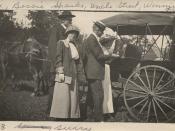Fear Dictates PoliticsJoseph Conrad's novel The Secret Agent is a story of politics. Set in London in the early 1900s, Conrad has included a character from every point on the social and political spectrums, from extreme anarchists on the left to equally as extreme fascists on the right and everything in between. Looking more closely at two characters in particular, each on different sides of the political spectrum, it is apparent that no matter your political views, many of your opinions and actions are driven by fear. These fears - fear of change, fear of the unknown, fear of freedom - are what classify an individual into a particular political party.
It is assumed that the Assistant Commissioner of police has more of a rightist view. He wants everything to stay the way it is (or was). The Assistant Commissioner is against foreign homogenization. He is afraid of people losing their cultural identity and becoming one collective group of "unstamped" (109) individuals with no sense of "their national [or] private characteristics."
He would rather have everyone be "stamped ⦠professionally, socially, [and] racially," clearly labeling them for distinct separation. As he is sitting in an Italian restaurant, he realizes he is not really indulging in a true Italian meal, but "fraudulent cookery" - a London imitation of Italian food. The Assistant Commissioner is very nationalistic. He wants everyone to stay in their own countries and cities and keep their cultures to themselves. He fears change and he fears a world of people without distinct identities.
Winnie Verloc, the wife of the Secret Agent himself, shares views that are more on the left side of the political spectrum. She is more concerned with domestic stability as opposed to the Assistant Commissioner's mission to save the world, London in particular, from...


